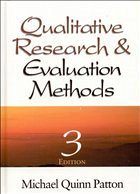Main description:
The completely revised and updated edition of this methodological classic continues to provide practical, comprehensive and strategic guidance on qualitative design, purposeful sampling, interviewing, fieldwork, observation methods, and qualitative analysis and interpretation while integrating the extensive qualitative literature of the last decade.
New to this edition:
- Twelve primary strategic themes of qualitative inquiry to clarify readers understanding of the different strands of qualitative research
- Five distinct criteria-based frameworks for presenting and judging qualitative findings
- Sixteen different theoretical and philosophical approaches to qualitative inquiry identified, compared and contrasted
- Variations in observational methods, including historical perspectives, ethical issues, and case studies
- Alternative interviewing strategies and approaches, including focus group interviews, group interviews, and cross-cultural interviews
- Additional new coverage on: new issues in and approaches to fieldwork; in-depth treatment of emergent designs and purposeful sampling; detailed analytical guidelines, including software and computer-assisted options; strategies for enhancing quality and credibility of qualitative findings, mixed methods, and triangulation; and, a review and listing of the latest internet resources
The book examines and honours both the science and art of qualitative inquiry. The qualities that made previous editions of this widely used book so highly valued by both seasoned professionals and students continue to shine through in this revision, including Patton's extensive experience, broad perspective, inclusive sensitivity, concrete examples, pragmatic orientation, and fine writing.
Review quote:
...
Paton has a distinguished career as an evaluation researcher and his experience in applying the tools of qualitative research to address the questions and concerns of those in the world of practice come through clearly a gem of a discussion of sampling strategies in qualitative research that is useful not only to prospective researchers but also to more seasoned ones. It is the most complete and carefully reasoned consideration of sampling in qualitative research that I have encountered
. Organizational Research Methods
Table of contents:
PART I. CONCEPTUAL ISSUES IN QUALITATIVE INQUIRY
1. The Nature of Qualitative Inquiry
2. Strategic Themes in Qualitative Inquiry
3. Variety in Qualitative Inquiry: Theoretical Orientations
4. Particularly Appropriate Qualitative Applications
PART II. QUALITATIVE DESIGNS AND DATA COLLECTION
5. Designing Qualitative Studies
6. Fieldwork Strategies and Observation Methods
7. Qualitative Interviewing
PART III. ANALYSIS, INTERPRETATION AND REPORTING
8. Qualitative Analysis and Interpretation
9. Enhancing the Quality and Credibility of Qualitative Analysis
The completely revised and updated edition of this methodological classic continues to provide practical, comprehensive and strategic guidance on qualitative design, purposeful sampling, interviewing, fieldwork, observation methods, and qualitative analysis and interpretation while integrating the extensive qualitative literature of the last decade.
New to this edition:
- Twelve primary strategic themes of qualitative inquiry to clarify readers understanding of the different strands of qualitative research
- Five distinct criteria-based frameworks for presenting and judging qualitative findings
- Sixteen different theoretical and philosophical approaches to qualitative inquiry identified, compared and contrasted
- Variations in observational methods, including historical perspectives, ethical issues, and case studies
- Alternative interviewing strategies and approaches, including focus group interviews, group interviews, and cross-cultural interviews
- Additional new coverage on: new issues in and approaches to fieldwork; in-depth treatment of emergent designs and purposeful sampling; detailed analytical guidelines, including software and computer-assisted options; strategies for enhancing quality and credibility of qualitative findings, mixed methods, and triangulation; and, a review and listing of the latest internet resources
The book examines and honours both the science and art of qualitative inquiry. The qualities that made previous editions of this widely used book so highly valued by both seasoned professionals and students continue to shine through in this revision, including Patton's extensive experience, broad perspective, inclusive sensitivity, concrete examples, pragmatic orientation, and fine writing.
Review quote:
...
Paton has a distinguished career as an evaluation researcher and his experience in applying the tools of qualitative research to address the questions and concerns of those in the world of practice come through clearly a gem of a discussion of sampling strategies in qualitative research that is useful not only to prospective researchers but also to more seasoned ones. It is the most complete and carefully reasoned consideration of sampling in qualitative research that I have encountered
. Organizational Research Methods
Table of contents:
PART I. CONCEPTUAL ISSUES IN QUALITATIVE INQUIRY
1. The Nature of Qualitative Inquiry
2. Strategic Themes in Qualitative Inquiry
3. Variety in Qualitative Inquiry: Theoretical Orientations
4. Particularly Appropriate Qualitative Applications
PART II. QUALITATIVE DESIGNS AND DATA COLLECTION
5. Designing Qualitative Studies
6. Fieldwork Strategies and Observation Methods
7. Qualitative Interviewing
PART III. ANALYSIS, INTERPRETATION AND REPORTING
8. Qualitative Analysis and Interpretation
9. Enhancing the Quality and Credibility of Qualitative Analysis

